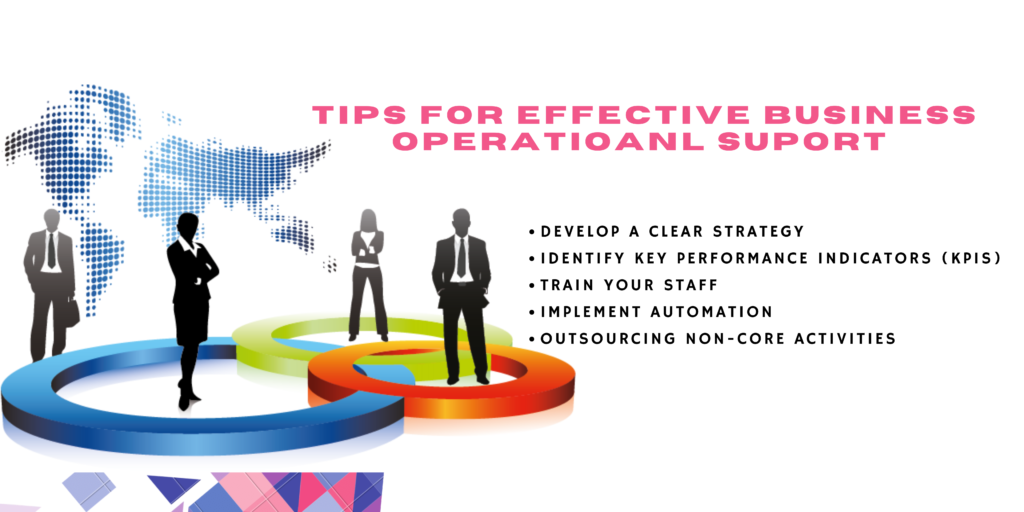Running a successful business requires more than just a great product or service. It would be best to have practical operational support to ensure everything runs smoothly. Without operational support, you run the risk of missed deadlines, unhappy customers, and decreased productivity. This blog post will explore what operational support is and how you can succeed with it.
What is Operational Support?
Operational support refers to the activities and services necessary to keep a business running smoothly. These activities may include IT support, customer service, and logistics management. The goal of business operational support is to ensure that all aspects of a business are working together seamlessly to achieve the company’s objectives.
Operational support can be divided into two broad categories: internal and external. Internal operational support refers to the activities and services provided within a company. For example, it may include IT support, human resources, accounting, and administration. External operational support, on the other hand, refers to the activities and services that third-party vendors or contractors provide. For example, it may include logistics, marketing, and customer service.
Why is Operational Support Important?
Operational support services are essential for the success of any business. Here are some of the reasons why:

- Improves Efficiency: Operational support helps businesses run more efficiently by streamlining processes and reducing bottlenecks. It can result in cost savings and increased productivity.
- Enhances Customer Satisfaction: Businesses can improve customer satisfaction by providing timely and effective operational support. In addition, it can increase loyalty, repeat business, and positive word-of-mouth advertising.
- Facilitates Growth: As businesses grow, their operational needs become more complex. Operational support services can help manage this growth by providing the necessary services and infrastructure to support expansion.
- Ensures Compliance: Many businesses operate in heavily regulated industries. Business operational support can help ensure compliance with regulations by providing the necessary documentation, reporting, and monitoring.
Read Also: The Ultimate Guide to Operational Support
How to Succeed with Operational Support?
Now that we understand what operational support is and why it is essential let’s explore how enterprises can succeed with operational support:
1. Make the Most of Your Expert Reps:
One of the keys to succeeding with operational support is to make the most of your expert reps. These individuals within your organization have specialized knowledge and expertise in areas such as IT, marketing, logistics, and customer service.
Here are some benefits of leveraging your expert reps:
- Expert reps can help solve complex problems more efficiently and effectively.
- Their specialized knowledge and experience can help identify root causes and develop targeted solutions.
- As a result, businesses can reduce the time and resources required to solve problems or complete tasks.
- In addition, improved customer satisfaction levels can increase loyalty and repeat business.
2. Use the Sales Aids and advice:
Another tip for succeeding with operational support is to use the right sales aids and advice. These are the tools and resources provided to sales teams to help them sell more effectively.
Here are some benefits of using the right sales aids and advice:
- The right tools and resources allow sales reps to work hard to sell more effectively.
- As a result, it can lead to increased revenue and profitability.
- In addition, providing sales reps with the necessary training and support can make them feel more confident in their selling ability.
- It can lead to increased motivation and engagement.
- It can enhance customer experience.
- When sales reps can provide relevant and targeted advice to customers, it can lead to a more pronounced customer experience.
- It can result in increased loyalty and positive word-of-mouth advertising.
3. Don’t Approach Training Alone:
One of the most critical aspects of operational support services is training. Ensuring employees are trained to use the systems and processes in place is essential. However, it can be challenging to develop and deliver effective training programs. It is where having a reliable supply partner can be beneficial. A reliable supply partner can provide training materials, conduct training sessions, and provide ongoing support to train employees properly.
Benefits of Having a Reliable Supply Partner:
- Saves time and resources that would otherwise be spent on developing training materials and conducting training sessions
- Ensures that training is delivered consistently across the organization
- Provides access to expertise and resources that may not be available internally
- Offers ongoing support to ensure that employees are using the systems and processes effectively
-
Take Help from Technology:
Another essential tip for succeeding with business operational support is to take help from technology. Many software tools and systems can be used to streamline processes and improve efficiency. For example, customer relationship management (CRM) software can help manage customer interactions, while project management tools can help manage complex projects.
Benefits of Using Technology:
- Improves efficiency by automating repetitive tasks and reducing errors
- Provides real-time data and insights that can be used to make informed decisions
- Enhances collaboration and communication across teams and departments
- Enables businesses to scale more effectively by providing the necessary infrastructure to support growth
-
Adopt Exam Tools:
Another way to succeed with operational support is to adopt the right tools. Various tools are available to businesses, including project management software, customer relationship management (CRM) software, and supply chain management software. Companies can improve their operational efficiency and effectiveness by choosing the right tools.
Benefits of Using the Right Operational Support Tools:
- Improved efficiency and productivity
- Increased accuracy and reduced errors
- Better collaboration and communication
- Streamlined processes and reduced bottlenecks
- Access to real-time data for better decision making
-
Increase Customer Portfolio with Marketing:
Marketing is another critical aspect of operational support. By developing a solid marketing strategy, businesses can increase their customer portfolio and improve their bottom line. It may include social media marketing, content marketing, and email marketing.
Benefits of Good Marketing Support:
- Increased brand awareness and recognition
- Improved customer engagement and loyalty
- Increased website traffic and lead generation
- Improved conversion rates and sales
- A better understanding of customer needs and preferences
-
Practice the Operational Support Services:
Finally, practicing operational support services is essential for succeeding with operational support. It involves putting theory into practice and ensuring that all activities are carried out effectively and efficiently.
Benefits of Putting Theory into Practice:
- Improved employee skills and knowledge
- Reduced errors and improved accuracy
- Improved customer satisfaction and loyalty
- Better alignment with company goals and objectives
- Improved operational efficiency and effectiveness
Tips for Effective Business Operational Support

Practical business operational support refers to the efficient and effective management of various operational activities within a business. It involves ensuring that all a company’s internal and external processes and services are optimized to enhance productivity, increase profitability, and improve customer satisfaction.
Effective business operational support ensures that a business can operate efficiently and effectively while delivering quality products and services to its customers. Some tips for implementing effective operational support services include:
- Develop a Clear Strategy: The first step in succeeding with operational support is to develop a clear strategy. This strategy should outline the goals and objectives of the business, as well as the specific operational support services required to achieve them. Companies can ensure that all stakeholders are aligned and working towards the same objectives by having a clear strategy.
- Identify Key Performance Indicators (KPIs): Once a clear strategy is in place, it is vital to identify key performance indicators (KPIs) that will be used to measure the success of the operational support services. These KPIs should be specific, measurable, and aligned with the business objectives.
- Train Your Staff: Training your staff is another critical aspect of operational support. By providing your employees with the necessary training and resources, you can ensure they have the skills and knowledge to carry out their responsibilities effectively. In addition, it can increase efficiency, reduce errors, and improve customer satisfaction.
- Implement Automation: Automation is an essential tool for businesses looking to improve their operational support. Companies can free up their employees to focus on more strategic activities by automating repetitive tasks. It can lead to increased productivity, reduced costs, and improved accuracy.
- Outsourcing Non-Core Activities: Outsourcing non-core activities can also help businesses succeed with operational support. By outsourcing activities such as accounting, HR, or IT support, companies can free up their internal resources to focus on core activities. As a result, it can lead to increased efficiency, reduced costs, and improved quality of service.
Conclusion:
In conclusion, operational support is essential to running a successful business. It encompasses a range of activities and services necessary to keep a business running smoothly and efficiently. Operational support can be divided into internal and external categories, each critical in achieving a company’s objectives.
Several key tips for succeeding with operational support include developing a clear strategy, training your staff, implementing automation, outsourcing non-core activities, adopting the right tools, and practicing your operational support services. By following these tips, businesses can improve their operational efficiency, enhance customer satisfaction, and increase their bottom line.
Ultimately, a business’s success relies on its operational support’s effectiveness. Companies can achieve their goals and remain competitive in today’s rapidly changing marketplace by recognizing the importance of operational support services and investing in the necessary resources and infrastructure.
Remember, operational support is not a one-time task but an ongoing process that requires constant evaluation and improvement. By investing in operational support, you are investing in the long-term success of your business.


